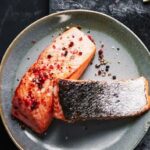With increasing age, food becomes more and more valuable. The rule is: You are what you eat! When appetite and thirst decrease over the years, it is particularly important to supply the body with high-quality nutrients and vital substances. We will show you what is important when it comes to nutrition in old age.
Eat well in old age!
In the course of life, eating and taking in the important nutrients and vital substances become more and more important. Health is not given to you. But you can influence them with a healthy diet in old age. It should also be fun and, above all, taste good! Colour-intensive, aromatic foods with a high density of vital substances contain valuable secondary plant substances. They make healthy eating possible in old age. The abundance and variability of our food allows everyone to prepare delicious alternatives – whether vegetarian recipes, vegan or as a quick meal.
Diseases do not inevitably occur in old age, but can also be an expression of having neglected a natural and healthy lifestyle for years. Our tips and rules for a healthy diet should therefore not only be taken into account in old age, but in every phase of life.
The natural process of aging – how the body changes.
Life often changes with age. Do not hesitate and therefore change your previous eating habits. The supply of energy moves into the background. A diet rich in vitamins and minerals is becoming increasingly important. A fat-conscious, high-fiber diet plan rich in phytochemicals is now important. Such a diet in old age is cell-friendly, regulates the metabolism and “detoxifies”. Fruit and vegetables and flavoring or seasoning foods in any form are loyal companions: berries, broccoli, nuts, garlic, cress or ginger are just a few examples. You should pay attention to the high quality and freshness of the important nutrients, carbohydrates, fats and proteins.
Your body will thank you for your diet as you age if you eat foods that are easy to digest. Small, fat-conscious snacks and portion sizes do not cause any problems for the circulatory system. The intestine can digest them without complications. Since hunger, appetite and thirst can decrease, you should always pay attention to the quality of the food you eat. So you can provide your body with all the important nutrients and vital substances, even with small portions.
Nutrition in old age – what should I eat?
One vital substance is particularly important in the diet of old age: protein! Protein is required by the body to maintain muscle mass. The musculature relieves the large joints, prevents uncontrolled falls and helps to maintain or lose weight. Regular sport and daily exercise complement efforts to prevent obesity, adult-onset diabetes and other signs of aging.
If you pay attention to your own diet in old age, checking the density of vital substances is also informative. If you are unsure, seek suitable nutritional advice and draw up a personal nutrition plan.
Less need for calories and at the same time higher need for vitamins and minerals means that the (low-calorie) vegetables are mixed with protein-rich and good fats and oils on the plate.
However, common diseases such as diabetes mellitus should not be neglected. Such a disease may require certain nutrition in old age in the form of a specially adapted diet. Even during the menopause there are valuable rules that will help you in this transition phase.
Tip: Let yourself be inspired by our recipes for nutrition in old age!
Omega-3 fatty acids
Supplying the organism with omega-3 fatty acids is important at any age, but especially in old age. They protect against cardiovascular diseases, they are an important part of the cells of the central nervous system and also the photoreceptor cells. Regular consumption of fish provides you with omega-3 fatty acids, for example.
Drink, drink, drink – although the thirst subsides
Prevent dehydration in old age – a drinking log can help
Thirst decreases with age due to various physiological causes. Actually, the body speaks up when it loses more than 0.5% of its weight in water. However, the mechanism works less reliably in old age. This lack of fluids can also be aggravated by medication for dehydration (in the case of cardiac insufficiency or high blood pressure). A drinking log is a reliable helper to keep a precise overview of your own drinking behavior. The German Society for Nutrition (DGE) recommends a water intake of 1.3 l per day via drinks for people over 65 years of age. In addition, about 680 ml of water should come from solid food. Water-rich foods such as cucumbers (97%), watermelons (91%) and aubergines (93%) are perfect companions to nutrition in old age. Due to their low calorie content, they can even help you lose weight a little.
Vegan in old age?
A vegetarian or vegan diet in old age can increase the risk of malnutrition. A precise balance and supply of all important vitamins and minerals must always be observed. Due to a higher risk of developing osteoporosis, one should also focus on the supply of calcium and vitamin D.



